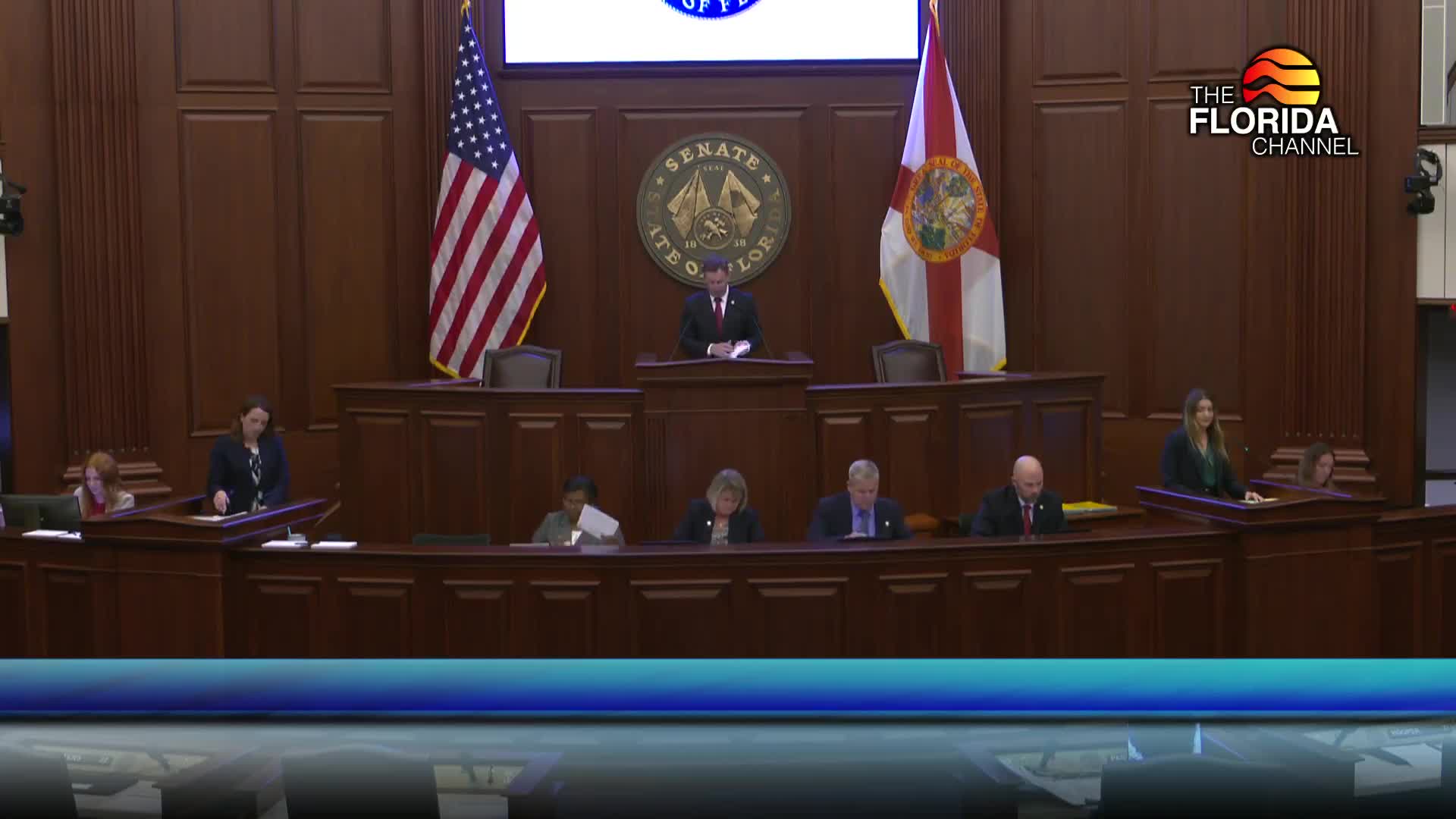Senate approves package of measures on health, manufacturing, public safety, utilities and corrections; key votes
Get AI-powered insights, summaries, and transcripts
Subscribe
Summary
In a single floor day the Senate approved multiple bills covering health screening for blood clots, manufacturing promotion and fees, public‑safety statutes, utility preemption and a high‑profile capital human‑trafficking measure; most bills passed with wide margins; the trafficking measure passed 27–11.
TALLAHASSEE — Monday’s Senate session yielded a string of enacted bills spanning health care, workforce development, public safety and corrections. Floor debate varied from brief sponsor explanations to extended exchanges on constitutional exposure and victim protections.
Votes at a glance
- SB 572 / CS for HB 593 (Pam Rock Act) — dangerous dogs: Passed 36–0. (See separate article.) - SB 1080 (local government land regulation; impact fees and comp‑plan rules): Passed (final tally not specified on the floor transcript). Sponsor: Senator McLean. The bill modernizes agricultural enclave language, defines “extraordinary circumstances” for impact fees and streamlines parts of the comprehensive plan approval process; sponsors removed ag‑enclave language by amendment during consideration. - CS for SB 1388 / CS for HB (voter/boating/driver sanctions omnibus): Passed 35–0. Sponsor: Senator Trumbull (amendment combined multiple boating and driver‑sanction provisions). - SB 890 / CS for HB 1421 (Emily Adkins Family Protection Act — VTE/blood clots): Passed 36–0. Sponsor: Senator Yarbrough. Creates a statewide venous thromboembolism (VTE) registry, requires reporting and adds training and informational materials for long‑term care. - CS for HB 113 (fleeing or attempting to elude a law enforcement officer): Passed 36–0. Sponsor: Senator Collins. The floor substitute removed a proposed vehicle‑impoundment provision before passage. - CS for HB 383 (purchase and possession of firearms by law‑enforcement, correctional and service members): Passed 33–3. Sponsor: Senator Collins. The bill expands off‑duty concealed carry authority for certain correctional officers subject to employing‑agency rules; the House substitute was accepted on the floor. - CS for HB 897 (timeshare plan management, substitute for SB 496): Passed 36–0. Sponsor: Senator McLean. Clarifies governance and meeting frequency for timeshare boards. - SB 540 / CS for HB 447 (Disability history and awareness instruction, Evan Hartsell Act): Passed 35–0. Sponsor: Senator Collins. Requires DOE to develop grade‑banded curricula and materials (see separate article). - SB 600 (statewide Office of Manufacturing and promotional campaign) and SB 602 (associated fee rulemaking): Passed 35–0 (SB 600) and 35–0 (SB 602). Sponsor: Senator Trudeau. Establishes a chief manufacturing officer in the Department of Commerce, a grants program and a promotional campaign; SB 602 clarifies fee use and restrictions on expenditures. - CS for HB 531 (public education background‑screening education page, substitute for SB 614): Passed 36–0. Sponsor: Senator Polsky. Requires a publicly available educational webpage about the care‑provider background‑screening clearinghouse and links on agency sites. - CS for HB 1137 (utility service restrictions / energy source preemption, substitute for SB 1002): Passed 36–0. Sponsor: Senator Trudeau. Preempts local governments from restricting energy sources and aligns local rules with state policy. - SB 1060 (Medicaid oversight joint committee): Passed 35–0. Sponsor: Senator Brisport? (sponsor listed in transcript as senator of the tenth district). Creates a legislative oversight committee to monitor Medicaid operations and contracting. - CS for HB 1095 (criminal‑offender substance‑abuse pilot program in Hillsborough County, substitute for SB 1140): Passed 37–0. Sponsors: Senator Gruters (Senate), House companion substituted. Establishes a time‑limited pilot for eligible felony or first‑degree misdemeanor offenders to participate in a supervised substance‑abuse treatment program. - SB 1804 (capital human‑trafficking of vulnerable persons for sexual exploitation): Passed 27–11. Sponsor: Senator Martin. The bill elevates certain trafficking conduct to a capital offense under narrowly defined circumstances and adds appellate authority for the attorney general; the measure generated extended debate on constitutionality, victim protection and penalties.
Floor pattern and next steps
Senators generally moved House companions onto the Special‑Order calendar and accepted technical and late amendments on the floor. Multiple sponsors told the chamber they had negotiated with stakeholders or other chambers before seeking substitution. Most measures recorded unanimous or near‑unanimous support; the trafficking bill was the clearest example of significant dissent, passing 27–11 after extended debate.
Why readers should care
Together these bills affect multiple policy areas: hospital reporting and long‑term care (VTE registry), workforce and economic development (manufacturing office and grants), public‑safety sentencing and statutory preemption (fleeing/eluding; energy restrictions), and criminal‑justice policy (Medicaid oversight panel; corrections pilot; capital‑trafficking statute). Officials in affected agencies — schools, hospitals, commerce, corrections and local governments — will need to track implementation and any related rulemaking.
Ending
Passed House companions will be returned to the House if further action is required. Several bills adopted on the Senate floor direct executive agencies (DOE, Department of Commerce, Department of Health, Department of Corrections) to implement or to publish materials; reporters and stakeholders should monitor those agencies’ rulemaking and guidance.
